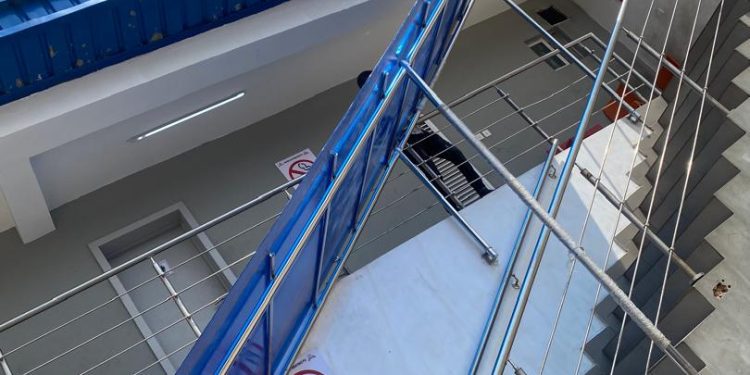In Nigeria, approximately 25 million people live with disabilities, representing about 15% of the population. Despite the significant number of individuals affected, issues of accessibility and inclusion remain largely unaddressed.
The Discrimination Against Persons with Disabilities (Prohibition) Act, enacted in 2018, aims to protect the rights of persons with disabilities, mandating that public buildings and facilities be designed with accessibility in mind. However, the enforcement of this law has been inconsistent, leaving many public spaces devoid of basic accommodations such as ramps, accessible restrooms, and designated pathways.
Public awareness about the needs of people with disabilities is still limited, often leading to social stigma and exclusion. Many individuals with mobility impairments find themselves marginalized, facing not just physical barriers but also societal attitudes that regard them as burdens rather than as equal members of society.
This systemic neglect perpetuates a cycle of dependency and isolation, making it challenging for individuals with disabilities to access essential services, education, and employment opportunities.
The lack of adequate infrastructure is particularly evident in key public facilities, including government offices, schools, hospitals, and transportation hubs. As a result, individuals like Margaret Okoya*, a 26-year-old lady with a physical disability, navigate a world that is often unwelcoming and inaccessible, leading to a profound sense of frustration and disappointment in a society that continues to overlook their rights and needs.
Margaret Okoya has lived all her life with frustration, not because of her physical disability, but because society has been shaped to continuously overlook her needs and those of other people with disabilities. Okoya’s life is a constant reminder that accessibility is not just a convenience, but a right.
Growing up in a small community, Okoya loved going to school, but the joy of learning was often overshadowed by the dread of getting to the classroom. “I used to get angry every time,” she recalls. “Not because I didn’t want to learn, but because I hated the way people looked at me with pity as they carried me up the stairs. If there had been ramps, I could have just pushed myself up.” The absence of ramps turned her journey to school into a daily reminder that she was different, that she was dependent on others in ways that were unnecessary.
Now an adult, Okoya still faces the same obstacles. Public buildings; government offices, libraries, hospitals, and even churches, often lack basic accommodations like ramps. “Nothing has changed,” she says.
“I still feel sad when I approach a building and realize I need help to get in. It discourages me from leaving the house.”
Remote work has been a blessing for Okoya, allowing her to earn a living from the comfort of her home, but the need for independence remains strong. When she needs to leave, particularly for church, she has to ask her siblings for help well in advance. “I always wonder why our landlord didn’t include a ramp. Is it that people like me are not supposed to live or rent spaces in this country?”
Okoya’s experience reflects a larger reality in Nigeria, where accessibility is often an afterthought. A recent investigation revealed that many public buildings are designed without ramps, creating insurmountable barriers for people in wheelchairs or those who use mobility aids. This lack of accessibility affects essential places; government offices, healthcare centers, schools, and shopping centers, excluding individuals with disabilities from vital services, employment opportunities, and full participation in society.
The consequences of this exclusion are severe. People like Okoya face social isolation and stigma, and they are often denied access to the very services that could help improve their lives. Public buildings, whether they be event centers, hotels, or banks, continue to be built without regard for the laws meant to ensure accessibility.
While the Discrimination Against Persons with Disabilities (Prohibition) Act mandates ramps and other inclusive features in public buildings, enforcement remains weak. This lack of accountability leaves countless buildings without ramps, forcing people with physical disabilities to depend on others when they should be able to move independently.
To ensure independent living for persons with disabilities, Okoya called for the building of ramps in public facilities; accessible entrances to allow wheelchair users easy access; accessible routes or alternative entrances should be available where ramps are not feasible; and training staff on disability awareness.
Okoya’s story is not just her own; it is the story of many Nigerians with disabilities who continue to fight for their right to access public spaces. The solution requires collective action. Government agencies must enforce accessibility laws, building owners must prioritize renovations, and society as a whole must recognize that inclusivity is not just a moral obligation but a legal one.
The absence of ramps in public buildings is a glaring reminder of the work still left to do. For people like Okoya, who want nothing more than to be part of the world around them, the issue is simple: ‘they are not asking for pity, just the chance to live their lives with dignity and independence.’
Okoya’s voice, and the voices of millions like her, call out for a society where all people, regardless of their abilities, have the opportunity to participate fully.
This article was written by Ifechukwude Onwuaduegbo, MSc Student of Mass Communication (2023/2024), University of Lagos, following the training on Disability Reporting facilitated by Blessing Oladunjoye, Publisher of BONews Service.

